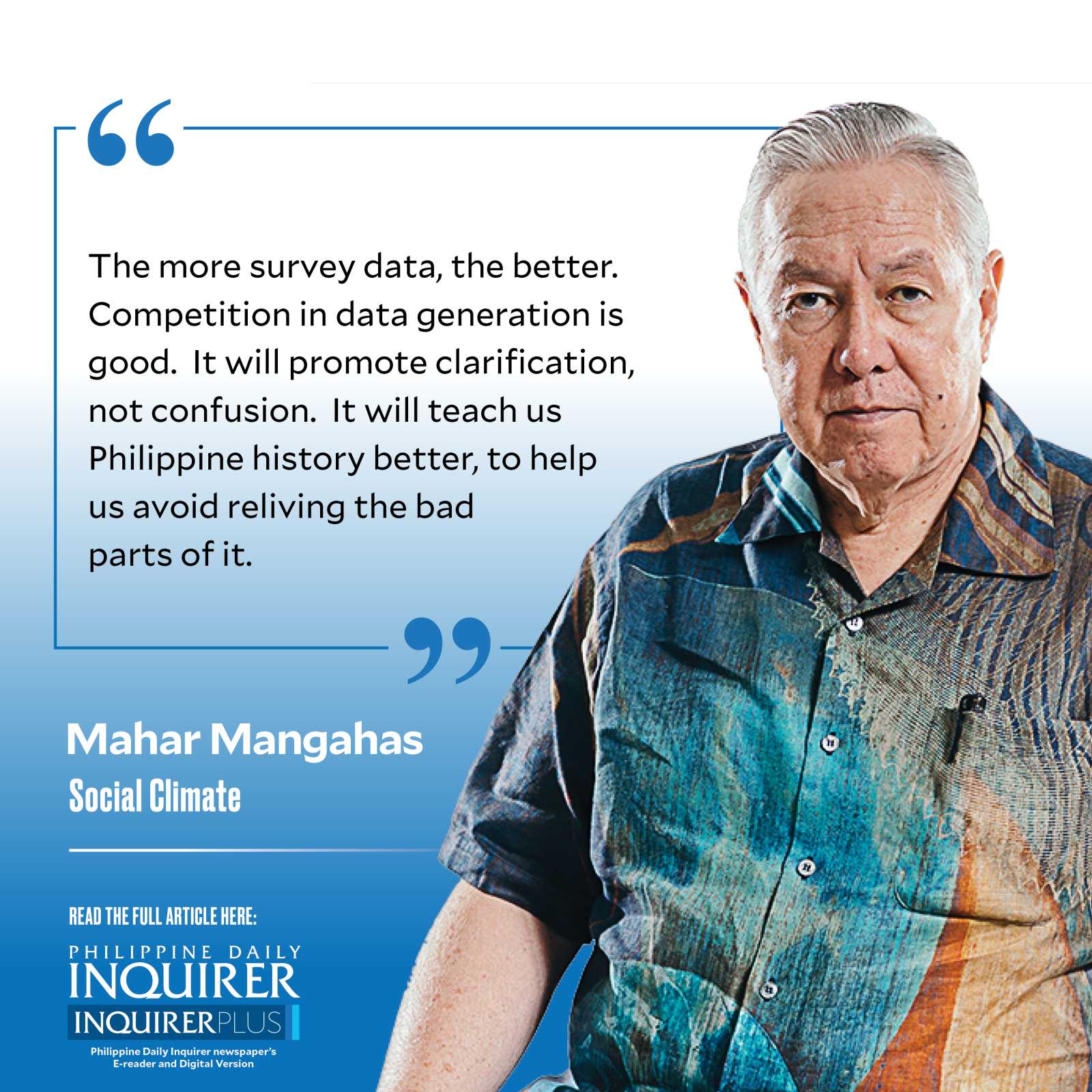Survey data are history

First, a little grammar lesson: the word “data” is plural, so it takes the verb “are” rather than “is.” The singular form of “data” is “datum.”
Survey data become history when, following the rule of my colleague Ambeth Ocampo the historian, they are properly obtained, documented, and preserved. (Getting the survey data into the history textbooks for young people to learn from is a separate task that I hope can be done, with Ambeth’s help.)
Article continues after this advertisementSurvey data are also priceless. They have no price because, in case of irretrievable loss, no amount of money can buy a replacement. It is simply impossible to go back in time. No one can replicate the Social Weather Stations (SWS) surveys of September 1987 and December 1989 that found solid disapproval in Metro Manila of the military coup attempts against then President Corazon Aquino. No one can replicate the 2001 SWS polls that found public approval of the way that President Joseph Estrada was removed from office.
Therefore, it is very important that survey data be properly archived, with multiple back-up copies, for the sake of informing present and future generations. Well-run data archives of scientific surveys exist in the world; there are best practices to be followed.
Both “losers” and “winners” appreciate survey data. I remember, back in 1992 at the Quirino grandstand after the inauguration of President Fidel Ramos, being approached by a gentleman who said he had run for senator, but only ranked 50- or 60-something in the SWS pre-election polls for the 24 seats at stake.
Article continues after this advertisementI was about to explain that I had no control over SWS findings, but he stopped me. He said he only wanted to give his congratulations, because, he said, SWS had exactly predicted his final rank in the Commission on Elections count. Then he went off with a smile; I regret not taking down his name.
Survey data can affect the course of history. I know of a candidate for local office who sponsored a series of polls about his election prospects, and decided to skip at least two election contests since he saw his chances as not yet good enough. He finally ran for the office after the polls showed him with a good chance to win, and he did win. This probably affected the timeline of the welfare of his constituents, hopefully favorably.
Public officials should be aware of public opinion, but are not obliged to follow the mainstream. People have a natural tendency to stick to the status quo, to what is familiar, and what they know they can cope with. In 1991, after a series of SWS polls had showed popular sentiment in favor of extending the stay of the United States military bases, and President Aquino proposed a new treaty to implement it, the Philippine Senate nevertheless rejected the treaty, by a narrow 12-11 vote (see Jovito R. Salonga, “The Senate that said No,” 1995).
The SWS polls saw valid reasons for the grassroots popularity of extending the stay of the US bases: firstly, a concern over the expected negative economic impact of a pullout on the communities of Angeles, Pampanga and Subic, Zambales; secondly, the feeling that there was no external military threat to the Philippines (at that time).
Ultimately, the military bases were abandoned—though also pushed along by the Mount Pinatubo eruption. The country did not turn into “an economic basket case,” as pro-bases factions had warned. New polls saw no public inclination to overturn the Senate’s decision; in short, the people changed their minds, not too long after 1991.
But what do Filipinos at present feel about stationing US military bases here, given the continued Chinese bullying to accept its claims in the Southeast Asia Sea (my preferred term for that body of water)? I don’t know of new surveys on this issue. What is very clear is that our trust of the US continues to be very high, whereas our trust of China continues to be not simply low, but outrightly negative.
Economic survey data are more reliable than political ones. In my view, the people’s reports about their own personal economic conditions are much more dependable than their assessments of the performance of specific politicians, and of the impact, not only presently but also potentially, of government policies on their lives.
In particular, the great fluctuations in poverty and hunger among the Filipino people in the past four decades are already history. The fluctuations and trends in economic well-being that are recorded by SWS are carefully kept, and publicly accessible for analysis. But we should not be alone in doing this.
The more survey data, the better. Competition in data generation is good. It will promote clarification, not confusion. It will teach us Philippine history better, to help us avoid reliving the bad parts of it.
—————-
Contact: [email protected].















